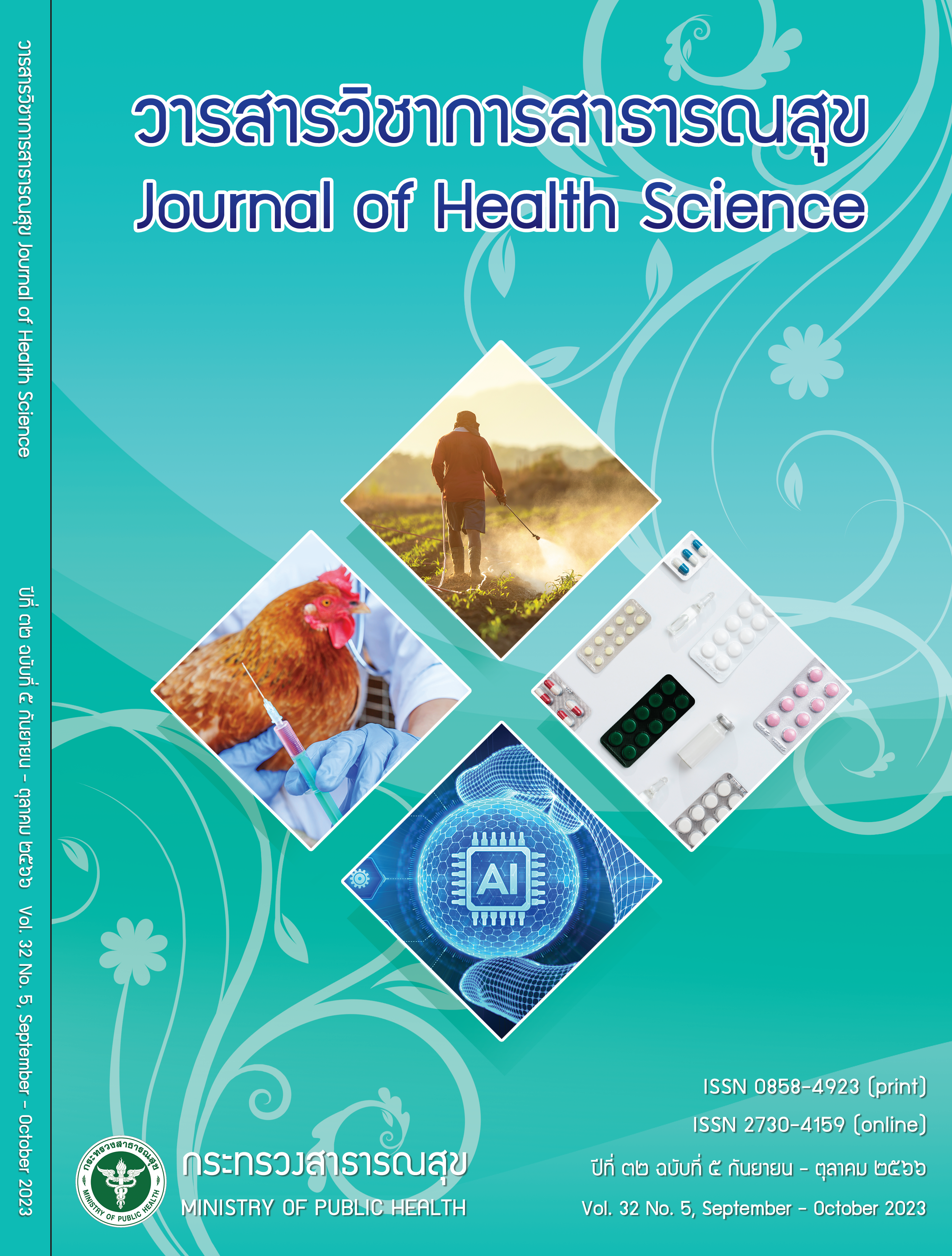การใช้ปัญญาประดิษฐ์ในการปฏิบัติการพยาบาล: ประเด็นปัญหาทางด้านจริยธรรม
คำสำคัญ:
ปัญญาประดิษฐ์, การพยาบาล, จริยธรรม, อคติ, ความเป็นส่วนตัวบทคัดย่อ
ในปัจจุบันมีการใช้ปัญญาประดิษฐ์ (artificial intelligence - AI) ในระบบสุขภาพ อย่างแพร่หลายรวมทั้งใน การปฏิบัติการพยาบาล ทั้งนี้มีวัตถุประสงค์เพื่อเพิ่มประสิทธิภาพในการดูแลผู้ป่ วย และการปรับปรุงผลลัพธ์ในการ พยาบาล การเพิ่มคุณภาพชีวิตของประชาชน บทความฉบับนี้มีวัตถุประสงค์เพื่อศึกษาเรื่องปัญญาประดิษฐ์ในการ ปฏิบัติการพยาบาล และประเด็นปัญหาจริยธรรม โดยการทบทวนบทความและเอกสารทางวิชาการทีเกี ่ ่ยวข้อง ปัญญาประดิษฐ์ คือ การประดิษฐ์เครื่องจักรเพื่อใช้แทนความฉลาดของมนุษย์ การทำงานมีลักษณะคล้ายมนุษย์ในด้านการ รับรู้ การให้เหตุผล บทบาทของปัญญาประดิษฐ์ในการพยาบาล ประกอบด้วย (1) การตรวจสอบและวินิจฉัยอาการ ของผู้ป่ วย (2) การจัดการในเรื่องการใช้ยา (3) การให้ความรู้แก่ผู้ป่ วย และ (4) การจัดการการทำงานของพยาบาล ปัญหาด้านจริยธรรมทีต้องพิจารณาที ่ เกี ่ ่ยวข้องกับปัญญาประดิษฐ์ในการปฏิบัติงานพยาบาล ประกอบไปด้วย (1) อคติ และการเลือกปฏิบัติ (2) ความเป็นส่วนตัวและการรักษาความลับ (3) ความตระหนักในความรับผิดชอบ (4) ความ เป็นอิสระและการดูแลโดยยึดผู้ป่ วยเป็นศูนย์กลาง และ (5) ความยินยอมที่ได้รับการบอกกล่าว การบูรณาการ ปัญญาประดิษฐ์ในการปฏิบัติการพยาบาลไม่สามารถทดแทนวัตถุประสงค์หลักของการดูแลผู้ป่ วย ซึ่งก็คือ การให้บริการ คำนึงถึงความเป็นมนุษย์ พยาบาลควรตระหนักว่า ปัญญาประดิษฐ์ส่งผลกระทบต่อกระบวนการพยาบาลและผลลัพธ์ ในการดูแลผู้ป่ วย ทั้งนี้การใช้ปัญญาประดิษฐ์ที่ขาดความระมัดระวังอาจจะมีปัญหาด้านจริยธรรมการพยาบาลได้ ข้อ เสนอแนะ (1) ควรมีการสอบถามผู้ใช้ และผู้ทีมีส่วนได้ส่วนเสีย (2) ผู้กำหนดนโยบายต้องจัดการกับปัญหาจริยธรรม (3) ควรมีการให้ความรู้กับพยาบาลประจำการอย่างต่อเนื่องและบูรณาการในการศึกษาพยาบาล
Downloads
เอกสารอ้างอิง
Copeland BJ. MYCIN. Encyclopedia Britannica [Internet]. 2018 [cited 2023 Apr 14]. Available from: https:// www.britannica.com/technology/MYCIN
สุดตา ปรักกโมดม, สัญชัย ฉายโชติเจริญ, พงศ์ธารา วิจิตเวชไพศาล. ‘ปัญญาประดิษฐ์’ มิตรหรือศัตรู. Thai J Anesthesiol 2019; 45(1);34-8
Nancy R. How artificial intelligence is changing nursing. Nursing Management 2019;50(9):30-9.
Bokolo A Jnr. Use of telemedicine and virtual care for remote treatment in response to COVID-19 pandemic. J Med Syst 2020;44:132.
Heidarizadeh K, Rassouli M, Manoochehri H, Zagheri M, Reza T, Ghorbanpour K. Effect of electronic report writing on the quality of nursing report recording. Electronic Physician 2017;9(10):5439-45.
หทัยชนก บัวเจริญ, วริยา จันทร์ขำ. การใช้นวัตกรรมทาง สุขภาพด้วยปัญญาประดิษฐ์ในการพยาบาล. วารสารพยาบาล 2563;69(4);60-7.
Stokes F, Palmer A. Artificial intelligence and robotics in nursing: ethics of caring as a guide to dividing tasks between AI and humans. Nurs Philos 2020;21(4):e12306.
Martinez-Martin N, Dasgupta I, Carter A, Chandler JA, Kellmeyer P, Kreitmair K, et al. Ethics of digital mental health during COVID-19: crisis and opportunities. JMIR Ment Health 2020;7(12):e23776.
ANA Center for Ethics and Human Rights. The ethical use of artificial intelligence in nursing practice [position statement]. Silver Spring, MD: American Nurses Association; 2022.
McCarthy J. What is artificial intelligence? Stanford, CA: Stanford University; 2007.
Möllmann NR, Mirbabaie M, Stieglitz S. Is it alright to use artificial intelligence in digital health? A systematic literature review on ethical considerations. Health Informatics J 2021;27(4):14604582211052391.
Russell S, Norvig P. Artificial intelligence: a modern approach. 3rd ed. Upper Saddle River, NJ: Pearson; 2009.
Shillan D, Sterne JAC, Champneys A, Gibbison B. Use of machine learning to analyse routinely collected intensive care unit data: a systematic review. Crit Care 2019; 23(1):284.
Hanson CW, Marshall BE. Artificial intelligence applications in the intensive care unit. Crit Care Med 2001; 29(2):427–35.
Ni Y, Lingren T, Hall ES, Leonard M, Melton K, Kirkendall ES. Designing and evaluating an automated system for real-time medication administration error detection in a neonatal intensive care unit. J Am Med Inform Assoc 2018;25(5):555-63.
Jun K, Oh S, Lee DW, Kim MS. Management of medication using a mobile robot and artificial intelligence. In: 2021 31th IEEE International Conference on Robot and Human Interactive Communication (RO-MAN). Jeju (Korea): IEEE; 2022. p. 652-9.
Christoforou EG, Avgousti S, Ramdani N, Novales C, Panayides AS. The upcoming role for nursing and assistive robotics: opportunities and challenges ahead. Front Digit Health 2020;2:585656.
Davenport T, Kalakota R. The potential for artificial intelligence in healthcare. Future Healthc J 2019;6(2):94- 8.
Clancy TR. Artificial intelligence and nursing: the future is now. J Nurs Adm 2020;50(3):125-7.
Kluge EHW. Artificial intelligence in healthcare: ethical considerations. Healthcare Management Forum 2020; 33(1):47-9.
Solimini R, Busardò FP, Gibelli F, Sirignano A, Ricci G. Ethical and legal challenges of telemedicine in the era of the COVID-19 Pandemic. Medicina (Kaunas) 2021;30;57(12):1314.
European Commission. Ethics guidelines for trustworthy AI. Luxembourg: European Union; 2019.
Koh WQ, Vandemeulebroucke T, Gastmans C, Miranda R, Van den Block L. The ethics of pet robots in dementia care settings: care professionals’ and organisational leaders’ ethical intuitions. Front Psychiatry 2023; 14:1052889.
ดาวน์โหลด
เผยแพร่แล้ว
วิธีการอ้างอิง
ฉบับ
บท
การอนุญาต

This work is licensed under a Creative Commons Attribution-NonCommercial-NoDerivatives 4.0 International License.







